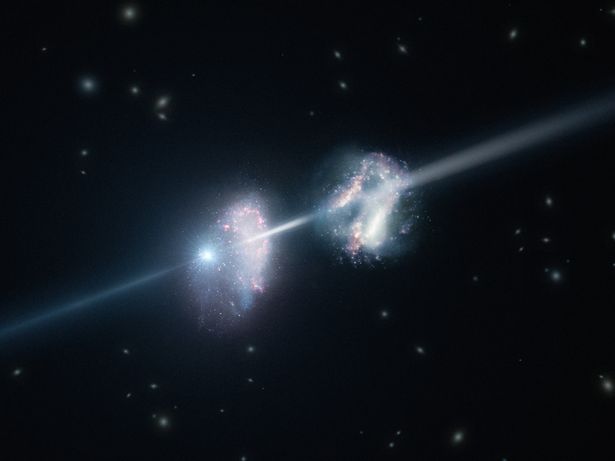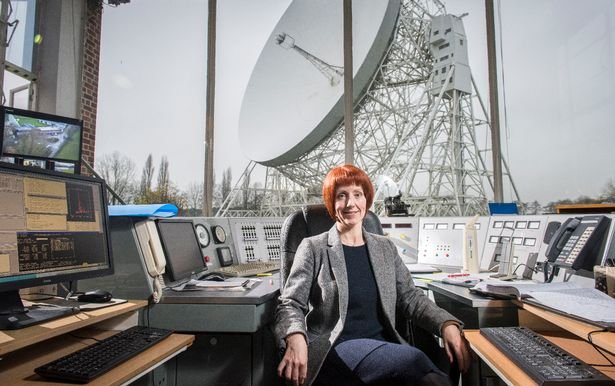Scientists based at the University of Bath have helped capture one of the most powerful explosions in the universe: a gamma ray burst .
The explosion was so bright it could have been seen “with a pair of binoculars” despite happening ten billion light years from Earth, according to the international team of scientists.
It provides the clearest picture yet of mysterious gamma ray bursts (GRBs) that have fascinated astronomers for decades, ever since they were first discovered in the late 1960s.
Short-lived gamma ray bursts (GRBs) are intense flashes of high-energy light detected by space-based telescopes orbiting above the Earth’s atmosphere.
Their bright flashes are thought to represent the birth of a distant black hole, formed in the death throes of a massive star as it explodes as a supernova.
But such prodigious energies have been hard to explain with standard explosion theories.
Robotic telescopes spotted the blast, dubbed GRB 160625B, in June 2016. It is so far away the 13.8 billion year old universe was just 3.8 billion years old at the time.
The only bigger cosmic fireworks display scientists know of is the Big Bang.
By an incredible one-in-10,000 chance experts at University of Bath, along with colleagues at NASA and around the world, detected its light as the star died.
Head of physics Professor Carole Mundell said: "It was so bright you could have seen it with a pair of binoculars.
"They usually happen instantly, but this time we got a flash of light lasting a second that acted as a warning. Then there was a delay of about 100 seconds, giving us enough time to position the telescopes.
"That is quite unusual, and the burst lasted longer than normal, a few minutes which was fortunate.
"Although very distant, this burst was extremely bright and we were excited when we realised our super-fast robotic telescopes had captured the early time light."
This allowed them to probe the magnetic fields very close to the black hole itself by measuring the polarisation properties of the light.
Her team followed how this changed in time, as the explosion developed.
The study, published in the journal Nature, reveals the role of magnetic fields in these immense explosions, as well as what the physical conditions are driving gamma ray bursts.
The group’s data suggests strong magnetic fields form close to the new black hole and drive energy and material outwards in a tightly focussed beam.
Co-author Prof Mundell said: “We’ve shown previously using slower autonomous robotic telescopes that magnetic fields must be important and help to guide the material outwards at high speed but, until now, we were never fast enough to capture bright visible light at the same time as the high energy gamma rays produced during the explosion itself.
“There is intense debate about the nature of these high speed flows - how material can be accelerated to such high speeds, what physical mechanism produces the light that we catch with our high-energy satellites, and most of all, what, if anything, is the role and origin of magnetic fields.
“Our results are important because they show that magnetic fields are present close to the central black hole, are threaded through the material that is ejected at ultra-high speeds in the explosion and ultimately focus and accelerate the material to large distances from the black hole.”
The data also suggest that synchrotron radiation—which results when electrons are accelerated in a curved or spiral pathway—powers the initial, extremely bright phase of the burst.
Until now there had been several other possible explanations but these results give a clearer picture of what physical conditions create GRBs.
Dr Eleonora Troja, an assistant research scientist in the University of Maryland and lead author of the research paper, said: “Gamma-ray bursts are catastrophic events, related to the explosion of massive stars 50 times the size of our sun.
“If you ranked all the explosions in the universe based on their power, GRBs would be right behind the Big Bang.
“In a matter of seconds, the process can emit as much energy as a star the size of our Sun would in its entire lifetime. We are very interested to learn how this is possible.”
This research was supported by the UK Space Agency, NASA, El Consejo Nacional de Ciencia y Tecnología, Mexico, the National Autonomous University of Mexico, the University of California Institute for Mexico and the United States-El Consejo Nacional de Ciencia y Tecnología Collaborative Grants Program, and the Russian Science Foundation.

Hi! I am a robot. I just upvoted you! I found similar content that readers might be interested in:
http://www.mirror.co.uk/science/devastating-gamma-ray-space-explosion-10875545
Downvoting a post can decrease pending rewards and make it less visible. Common reasons:
Submit
Hi. I am a volunteer bot for @resteembot that upvoted you.
Your post was chosen at random, as part of the advertisment campaign for @resteembot.
@resteembot is meant to help minnows get noticed by re-steeming their posts
To use the bot, one must follow it for at least 3 hours, and then make a transaction where the memo is the url of the post.
If you want to learn more - read the introduction post of @resteembot.
If you want help spread the word - read the advertisment program post.
Steem ON!
Downvoting a post can decrease pending rewards and make it less visible. Common reasons:
Submit
nice article..we are lucky it is 10 billion years away :D
Downvoting a post can decrease pending rewards and make it less visible. Common reasons:
Submit
yes :) .. hopefully space weather will remain quiet in the next few years .. but i have a strange gut felling something is on its way..
Downvoting a post can decrease pending rewards and make it less visible. Common reasons:
Submit
well, sooner or later, strong cosmic explosion is going to happen near enough to affect life on Earth..
Downvoting a post can decrease pending rewards and make it less visible. Common reasons:
Submit
i agree .. donno how or when.. but the gammaray burst , supernova or carrington event like solar flare will eventually hit us .
out magnetosphere is gettin weaker & weaker .. geo magnetic pole shift is imminent .. lets hope for the best
Downvoting a post can decrease pending rewards and make it less visible. Common reasons:
Submit